In recent years, more and more institutions and regulatory bodies in the traditional financial sector have begun to accept cryptocurrencies, while an increasing number of projects in the crypto space aim for compliance in exchange for greater exposure. The build-up takes time, but the explosion can happen in an instant, as seen with the inauguration of the Trump administration, the shift in the SEC's stance, the recent passage of the stablecoin bill, and the entry of crypto exchange Coinbase into the S&P 500 index, among other trend indicators.
This has led previously cautious crypto projects and brokerage firms to start engaging in security tokenization businesses "without reservation," resulting in the emergence of on-chain "Nasdaqs" springing up like mushrooms after rain.
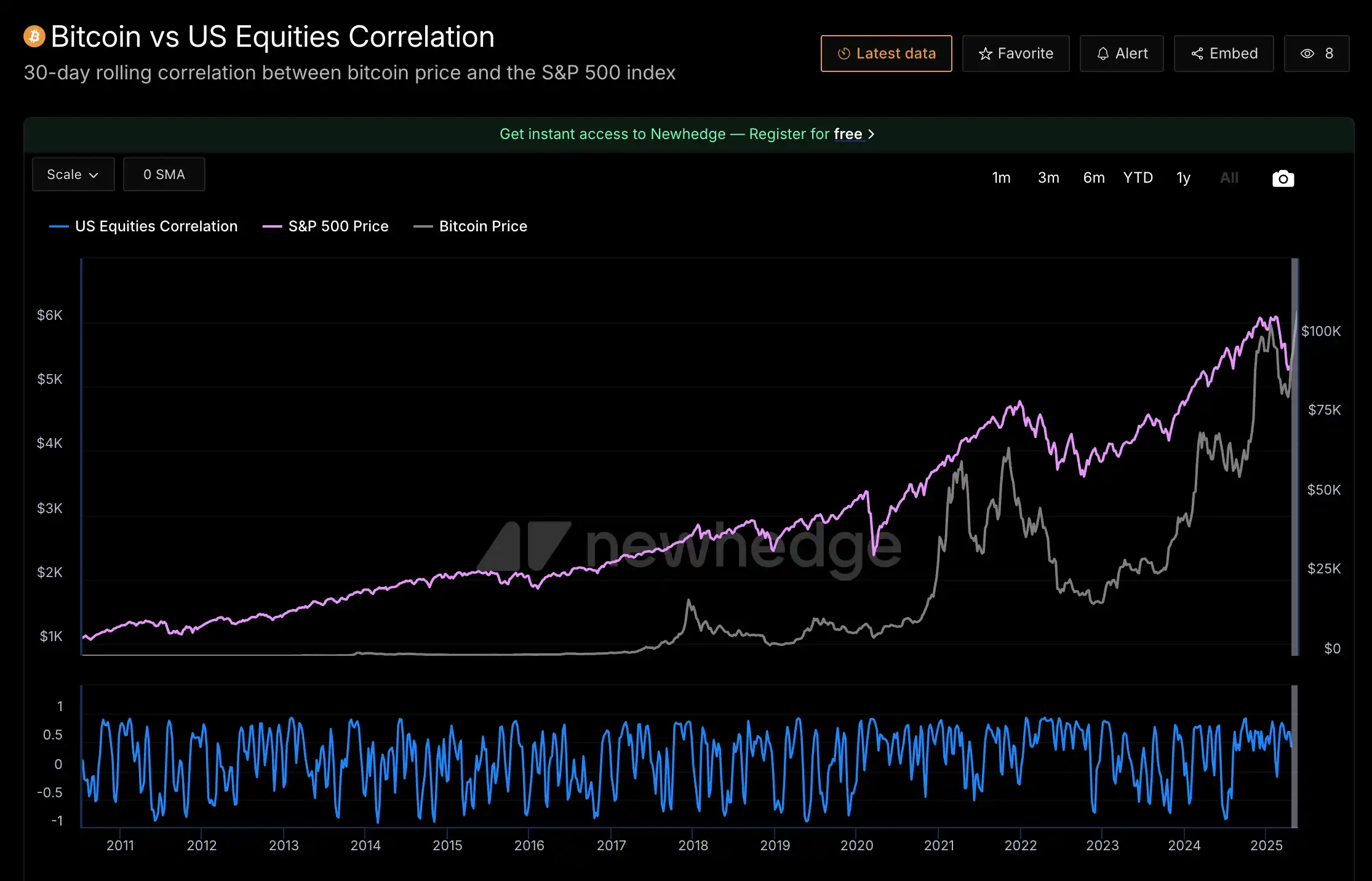
Where else can you buy "on-chain stocks"?
Not only are "crypto" concept stocks popular among investors in the U.S. stock market, but the tokenization of U.S. stocks and securities in the crypto space has also recently sparked a wave of interest.
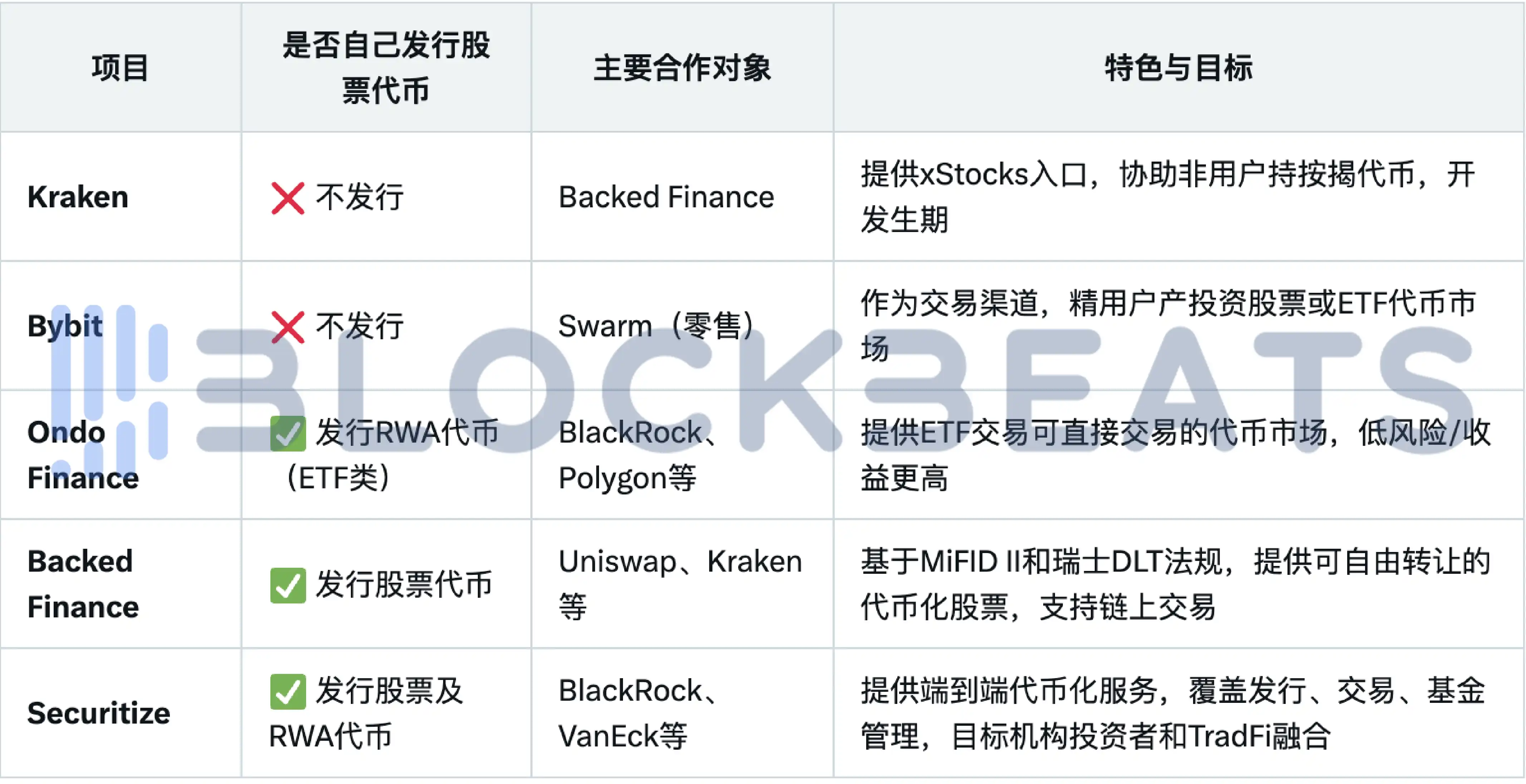
Comparison of security tokenization concept projects in the crypto space, chart by BlockBeats
XStocks
Kraken, a well-established cryptocurrency exchange founded in 2011, announced on May 22 that it has partnered with Backed Finance to launch a tokenized stock and ETF trading service called "xStocks," covering over 50 U.S. listed stocks and ETFs, including Apple, Tesla, and Nvidia.
This project will be exclusively issued on the Solana blockchain, receiving strong support from Solana's official team. Several team members from Kraken and Backed appeared at yesterday's Solana Accelerate 2025 event to express their views on the future of security tokenization.
Bybit
Founded in 2018, Bybit does not issue tokens in the field of stock tokenization but supports the trading of tokenized assets as a trading channel. It collaborates with retail platforms like Swarm to provide a trading market for stock or ETF tokens. Bybit offers stock trading tools based on Contracts for Difference (CFD), allowing users to participate in stock price fluctuations "without holding the underlying stocks." Notably, it allows leverage of up to 5 times.
Bybit also supports the trading of RWA tokens (such as TRAC) through its copy trading feature and NFT marketplace, targeting selected users to invest in tokenized assets. It has opened trading for 78 selected stocks, including Apple, Tesla, and Nvidia, with a fee of 0.04 USDT per share and a minimum order fee of 5 USDT.
Ondo
Ondo Finance is one of the most comprehensive projects in the crypto "security tokenization" space, building an integrated RWA (tokenization system) that covers asset issuance, liquidity management, and underlying infrastructure. Its core products include two types of asset tokens, OUSG and USDY, as well as the liquidity protocol Nexus, the lending platform Flux, and the upcoming compliant permissioned chain Ondo Chain.
In February 2025, Ondo held its first Summit in New York, officially unveiling its GM "Global Markets" platform design, aimed at tokenizing thousands of publicly traded securities (such as Apple, Tesla, and the S&P 500 ETF) and enabling 24/7 trading and instant settlement on-chain. All tokens on the GM platform are backed 1:1 by physical securities, but the issuance and redemption process includes built-in compliance authority controls, targeting markets outside the U.S. and striving to create "Wall Street 2.0."
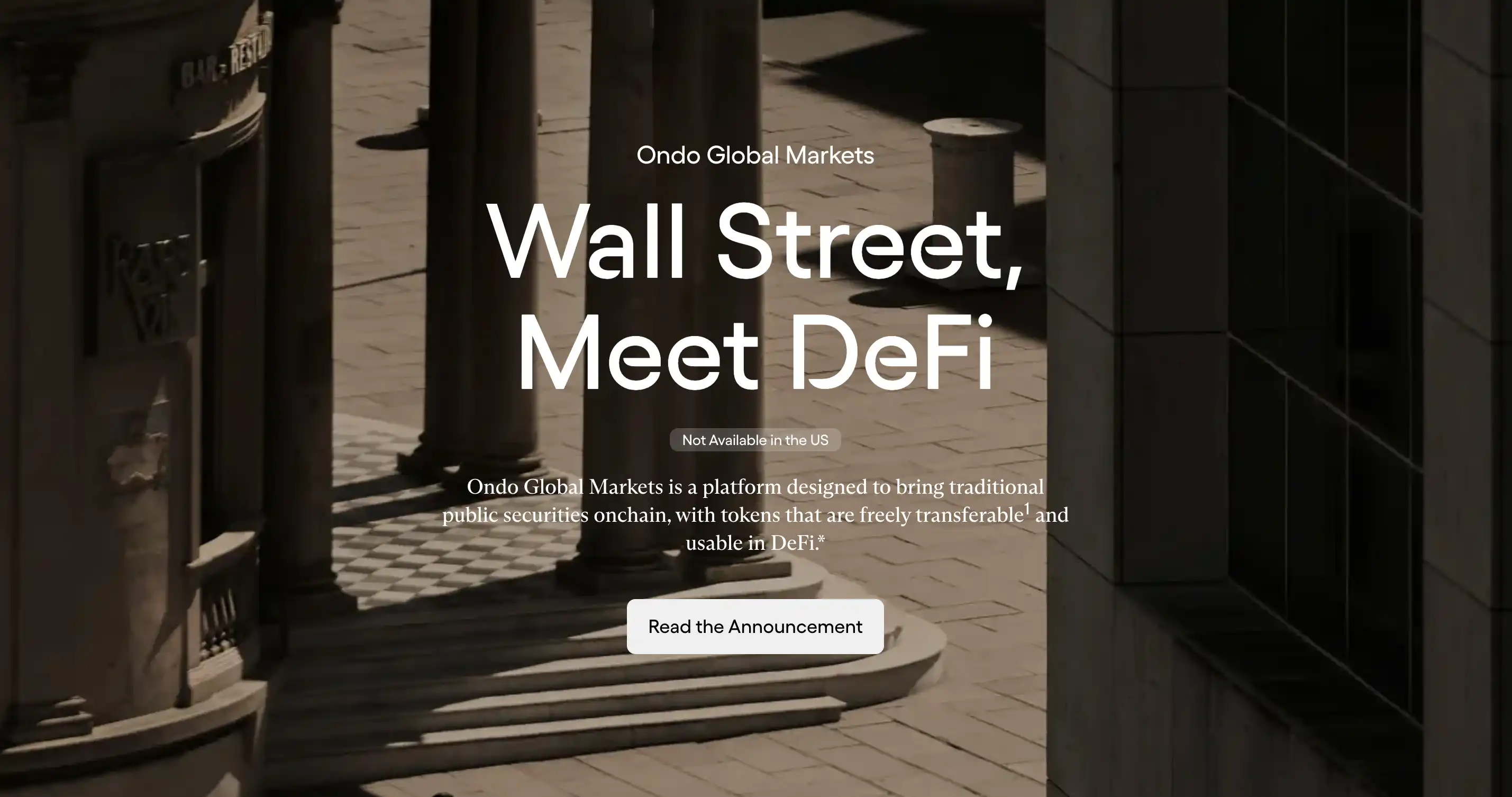
To support its "grand strategy," Ondo also announced the launch of a compliant chain for institutions, Ondo Chain, which adopts a semi-permissioned architecture allowing anyone to issue and develop, but with validation nodes held by well-known financial institutions to ensure compliance and security. The chain natively supports financial operations such as dividend distribution and stock splits, and introduces an on-chain reserve proof mechanism to ensure that tokens are fully backed by assets, aiming to become the infrastructure for core operations in traditional finance, such as main brokerage and cross-asset collateralization. On May 19, Kinexys, a subsidiary of JPMorgan Chase, executed the first cross-chain "Delivery vs Payment" transaction on Ondo Chain.
Although GM and Ondo Chain have not yet officially launched, the core assets of the Ondo ecosystem, OUSG and USDY, have reached scales of 545 million and 634 million dollars, respectively. OUSG is primarily held by institutions on Ethereum, while USDY shows a higher retail user adoption rate on Solana.
Notably, most members of the Ondo team come from top institutions like Goldman Sachs and McKinsey, and they actively participate in communication and coordination with U.S. regulatory bodies such as the SEC and CFTC, deeply engaging in policy formulation, compliance design, and public relations, including inviting former Congressman Patrick McHenry to join the advisory board, showcasing their ambition and resource integration capability in bridging traditional finance and the crypto industry.
Securitize
In the gradually compliant crypto industry, there are also companies with strong ties to the government and brokerages, such as Cantor, which is responsible for 99% of Tether's U.S. Treasury purchases and is one of the 24 major dealers for the U.S. Treasury. Cantor directly participates in the issuance and trading of U.S. Treasuries and maintains close business ties with the Federal Reserve and the Treasury, resulting in Tether generating 2 billion dollars in revenue from U.S. Treasuries alone in mid-2023.
The combination of companies like Cantor and Tether is not an isolated case. BlackRock, the world's largest asset management company, established the BUIDL fund in 2024, which has become a leader in the RWA sector this year with over 2.5 billion dollars in assets under management. The designated custodian for BUIDL is Securitize, which was founded in 2017 and focuses on blockchain technology and digital asset securitization.
However, unlike traditional crypto companies, Securitize's management is filled with Wall Street executives. Brett Redfearn, who was appointed as the director of the SEC's Division of Trading and Markets in 2021, still serves as a senior strategic advisor and chairman of the advisory board. Securitize also has a very close relationship with the newly appointed SEC Chairman Paul Atkins, who joined Securitize in 2019, serving as a committee member and board member of the advisory board, holding up to 500,000 dollars in call options, and just stepped down in February of this year. Coincidentally, in 2019, Securitize became a registered broker-dealer with the SEC and an operator of an SEC-regulated Alternative Trading System (ATS).
On the eve of this "compliance" wave, Securitize may also become one of the best pathways to bridge crypto and traditional finance due to its compliant "background."
Stealing food from the tiger's mouth?
The signs of brokerages participating in crypto began even earlier, with several securities exchanges attempting to integrate crypto businesses years ago.
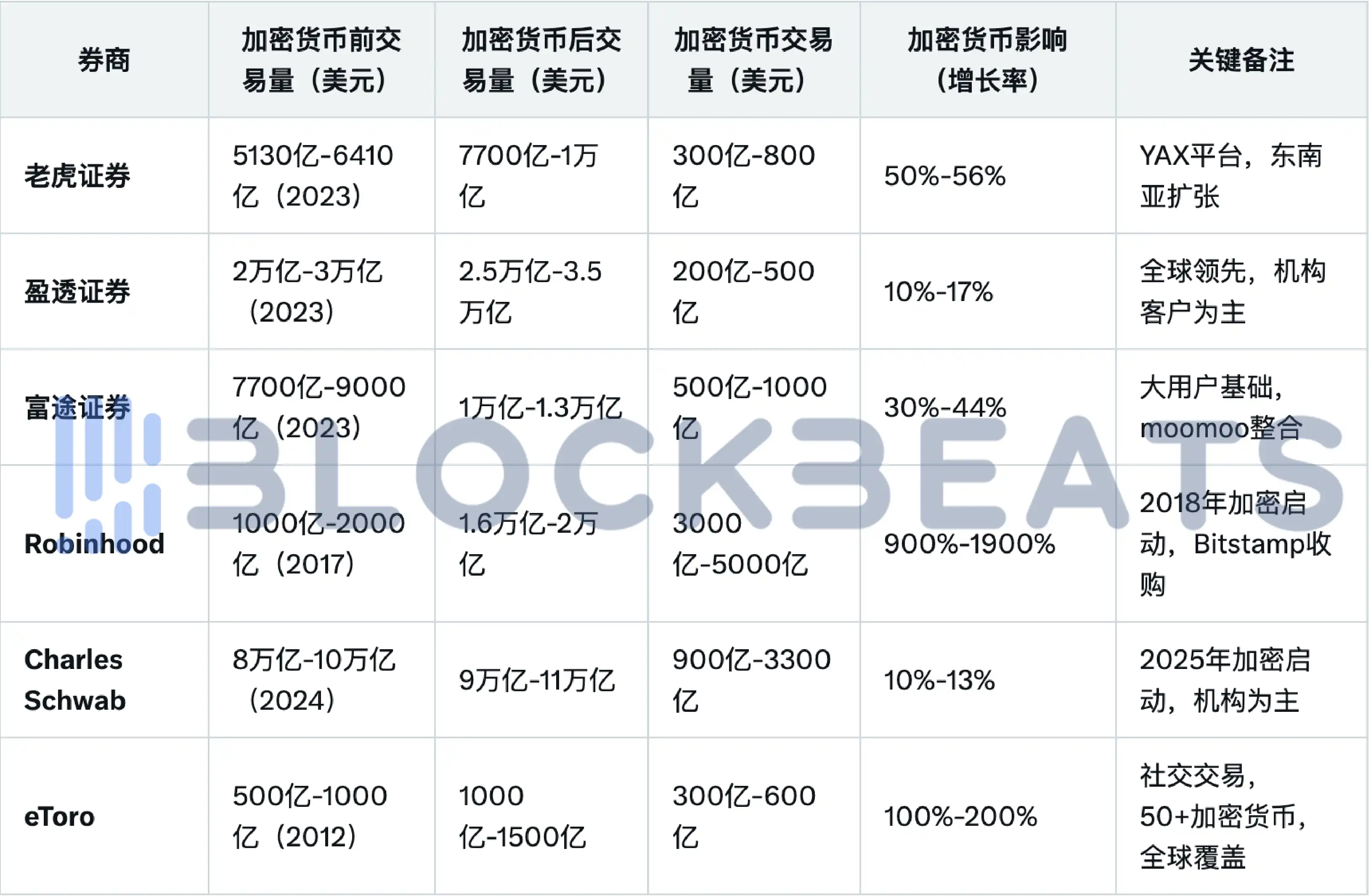
Comparison of data before and after major securities firms joined the "crypto concept," chart by BlockBeats
eToro is an Israeli fintech company founded in 2007, which first launched Bitcoin trading services in 2013. Since then, eToro has continuously expanded its digital asset product line, gradually adding support for trading mainstream cryptocurrencies such as Ethereum, Ripple (XRP), and Litecoin.
Robinhood may be the most well-known securities firm in the crypto space, having entered the crypto field as early as 2018 and widely recognized during the Trump Coin era. After announcing a 200 million dollar acquisition of the European digital asset trading platform Bitstamp, Robinhood expanded into Singapore in March of this year, obtaining regulatory approval through Bitstamp and integrating into Singapore's crypto-friendly framework. Bitstamp has received in-principle approval from the Monetary Authority of Singapore (MAS), providing Robinhood with significant regulatory advantages and simplifying its market entry process.
By prioritizing regulatory compliance, Robinhood differentiates itself from offshore platforms operating in legal gray areas, which is one of the advantages traditional brokerages have over some crypto CEXs in promoting global tokenized securities.
Robinhood's expansion into Singapore is part of its larger international growth strategy. Robinhood has previously launched crypto trading in Europe and initiated stock options trading in the UK. As its licensing scope expands, Robinhood is providing comprehensive services that include both digital finance and traditional finance in multiple regions.
This month, Robinhood also accelerated its process of securities market tokenization. On May 8, Robinhood announced plans to launch a blockchain-based platform for trading U.S. assets in Europe. On May 20, Robinhood submitted a 42-page proposal to the U.S. Securities and Exchange Commission (SEC) suggesting the establishment of a federal-level "RWA tokenization" framework aimed at modernizing the U.S. securities market.
Not only in Europe and the U.S., but some brokerages in Hong Kong also began exploring related fields last year. By June 2024, several Hong Kong brokerages started to offer trading services for virtual assets such as Bitcoin. Brokerages like Victory Securities, Tiger Brokers, and Interactive Brokers in Hong Kong have all launched corresponding services. Some brokerages place even greater emphasis on their crypto business, expecting that revenue related to their crypto operations could account for about a quarter of their total income.
On May 7, 2025, Futu Securities also announced the official launch of Bitcoin, Ethereum, and USDT deposit services. Users can complete deposits and trade cryptocurrencies alongside traditional financial assets, including Hong Kong, U.S., and Japanese stocks, options, ETFs, funds, bonds, and other diverse assets, allowing for quick conversions between virtual and traditional asset markets.
Failed Attempts and the Dilemma of Offshore Platforms
In fact, as early as around 2020, "tokenized stocks" were boldly tested by some crypto platforms. This model aimed to map traditional stocks into tradable digital assets through blockchain technology, breaking many of the limitations of traditional financial markets in terms of time, geography, and entry barriers.
In this experiment, FTX was undoubtedly the most aggressive pioneer.
Around 2020, FTX was the first to launch its tokenized stock trading feature. Users could trade tokens of well-known U.S. companies such as Tesla (TSLA) and Apple (AAPL) on its platform. These tokens were issued by its Swiss subsidiary Canco GmbH and were linked to real stocks held in custody by third-party brokers, achieving a "1:1 peg" mapping relationship.
At that time, users could participate in investments in popular U.S. stocks with a minimum of about 1 dollar, 24/7 (a plan that later Nasdaq wanted to implement to absorb "global liquidity"). Additionally, users could redeem actual stocks with the tokens, although this process was limited by platform policies and compliance requirements.

Differences in tokenized stock trading between FTX and Binance, chart by BlockBeats
To ensure "compliance," FTX collaborated with German financial services institutions CM-Equity AG and Digital Assets AG to create a compliance framework that would give these U.S. stock tokens legitimacy and financial connectivity. However, this business ultimately did not progress further. In November 2022, FTX declared bankruptcy due to serious issues such as fund misappropriation and fraud allegations, and its tokenized stock business was subsequently halted.
In April 2021, Binance also briefly entered the tokenized stock space, launching stock token products settled in its stablecoin BUSD, initially including star stocks like Coinbase (COIN) and Tesla (TSLA), continuing to promote the concept of fractional investing.
However, the challenges faced by Binance did not come from the market but from regulatory pressure. Due to the lack of a unified regulatory framework for security tokens, Binance first received inquiries from financial regulators in Italy, Germany, and the UK regarding its stock tokens, which were deemed to potentially constitute unauthorized securities issuance or trading. Subsequently, other countries, including Japan, the U.S., Canada, Thailand, and the Cayman Islands, took measures against Binance, including investigations, criminal lawsuits, or prohibiting the platform from operating within their jurisdictions.
On the other hand, as crypto exchanges and brokerages chase the market for security tokenization, discussions have emerged in the community regarding this matter. For "Crypto Native" funds that thrived during the ICO era and the subsequent Memecoin craze, the returns obtained from traditional interpretations of a company's PE, PS, business model, and financial reports may far exceed what they are accustomed to, leading to a lack of enthusiasm for traditional stocks among Crypto Natives.
Conversely, high-net-worth individuals in traditional sectors may be very interested in the "high yields" of crypto assets or AI assets, which was previously what Crypto CEXs aimed to achieve. In the current context where both parties' businesses are gradually converging, this type of client is likely to trust platforms of traditional brokerages like "Robinhood, eToro, and Futu" more.
Stablecoins + Securities on the Blockchain, Is a Liquidity Closed Loop Coming?
On May 22, David Sacks, the White House's cryptocurrency and AI director, referred to as the "crypto czar," stated that the stablecoin bill would unlock trillions of dollars for the U.S. Treasury. Just a day earlier, the U.S. Senate voted to advance the "cloture motion" for the GENIUS Stablecoin Act into formal deliberation, with at least 15 Democratic senators changing their original stance to vote in favor. The bill is now set to enter a comprehensive review process, although it has only passed the "cloture motion" and has not yet been approved.
However, the market generally holds an optimistic view on the advancement of the GENIUS Act, as it will provide a clear regulatory framework for security tokenization, particularly based on stablecoins and RWA tokenization, which may extend to stock tokenization. This will reduce compliance risks for market participants and attract more institutional investors. Previously, projects like Backed Finance and Securitize had already launched tokenized stocks based on MiFID II and SEC regulations, and if the GENIUS Act passes, it could further accelerate growth.
Once stablecoins are compliant, they may reduce friction in cross-border transactions through blockchain technology, attracting global investors to participate in the U.S. market. In fact, many institutions and countries have already begun to respond. On May 17, Moonpay partnered with Mastercard to allow users to use stablecoins at over 150 million locations accepting Mastercard, with these stablecoins being instantly convertible to fiat currency at the point of sale. On May 21, South Korean presidential candidate Lee Jae-myung proposed issuing a stablecoin based on the Korean won. Meanwhile, according to The Wall Street Journal, major commercial banks such as JPMorgan Chase, Bank of America, Citigroup, and Wells Fargo are discussing the joint issuance of stablecoins with Early Warning Services, the operator of the Zelle payment system, and the real-time payment network Clearing House.
However, JPMorgan analysts disagreed with David Sacks' trillions of dollars statement, arguing that while the U.S. stablecoin regulatory framework is gradually advancing, the market's predictions that the total supply of stablecoins will triple or quadruple from the current approximately 240 billion dollars to nearly a trillion dollars within the next one to two years are "overly optimistic."
Despite this, stablecoins have reached a stage where their total supply now accounts for 1.1% of the dollar supply after years of development. Due to their high yields and convenience, as well as their potential significant role in the future of global securities tokenization, they have reached a level that traditional markets can no longer ignore.
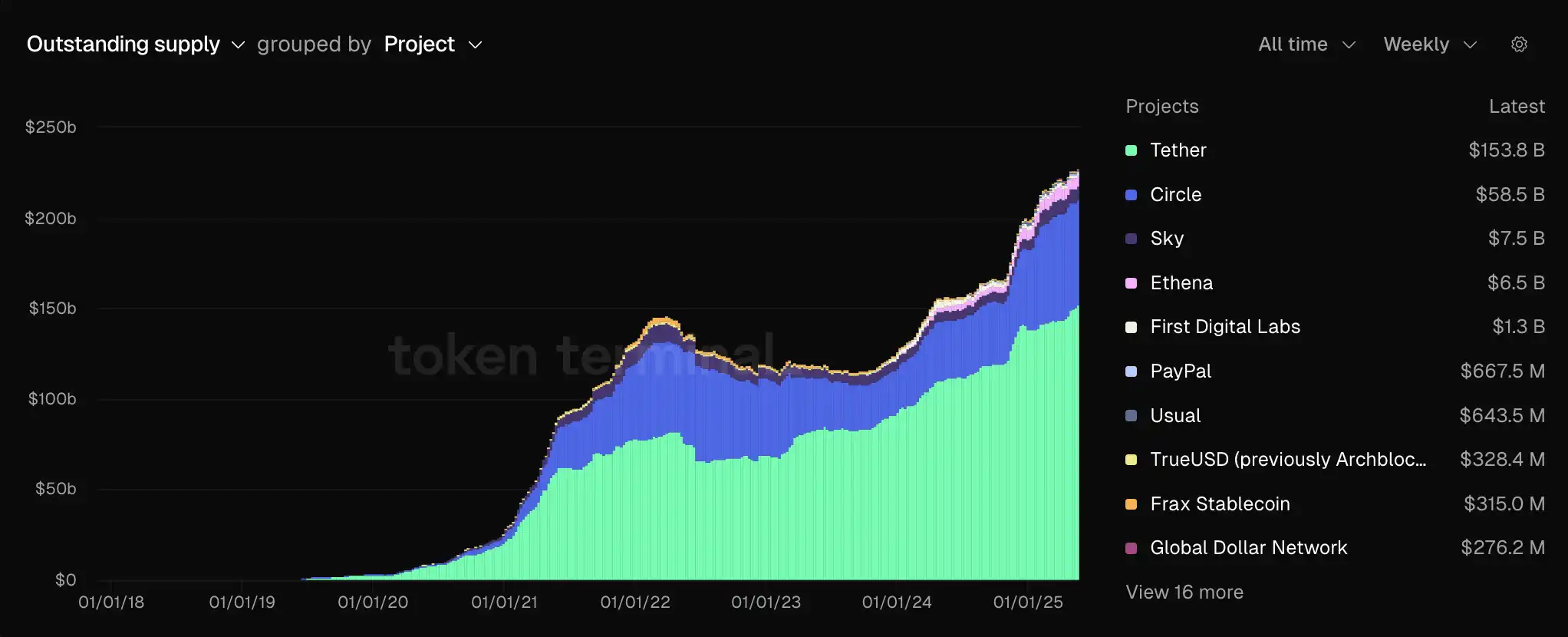
Data from tokenterminal, current market share of major stablecoins
The "tokenization" revolution in cryptocurrencies is akin to the transformation of the music industry from physical records to digital music, from the chaos of copyright disputes sparked by Napster to the rise of compliant platforms like iTunes and Spotify. The process of moving from chaos to compliance has not been easy. However, now, with the accelerated integration of crypto and securities, we stand at a crossroads of this era. This process may also be filled with uncertainty and risk, but perhaps a more open, transparent, and efficient financial new era is about to arrive.
免责声明:本文章仅代表作者个人观点,不代表本平台的立场和观点。本文章仅供信息分享,不构成对任何人的任何投资建议。用户与作者之间的任何争议,与本平台无关。如网页中刊载的文章或图片涉及侵权,请提供相关的权利证明和身份证明发送邮件到support@aicoin.com,本平台相关工作人员将会进行核查。




